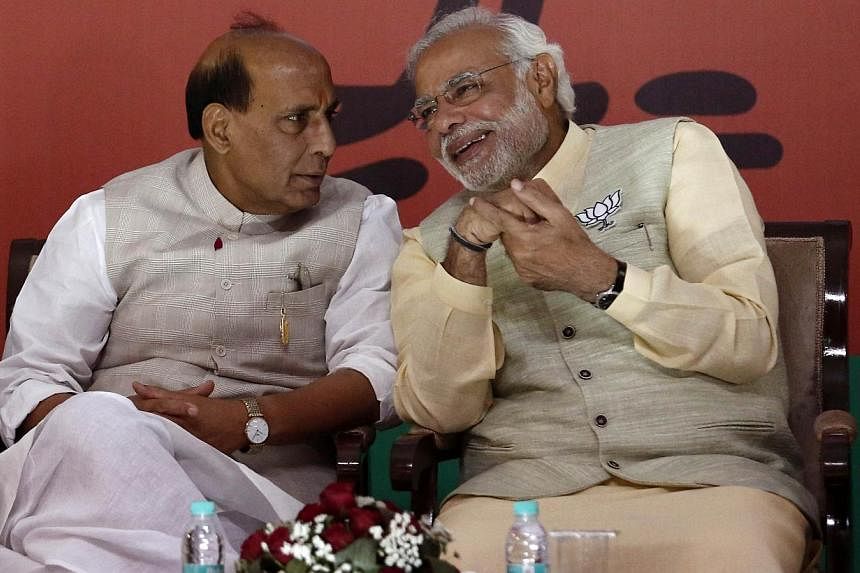NEW DELHI - The opposition Bharatiya Janata Party has clinched a "historic win" breaking the barriers of class and caste, said its leader Rajnath Singh as the party headed for a landslide victory on Friday.
Coalition politics have dominated Indian politics for decades, with no national party in the last 30 years reaching a majority of 272 seats in a 543-seat Parliament on its own.
The BJP is set to cruise past the halfway mark on its own, leading in 282 seats while its allies were leading in 50 seats.
"After 1984 this is the first time in this country a party has got a clear majority. For the first time social and geographical boundaries have been breached and caste and religious lines have been blurred," said BJP president Rajnath Singh said, calling it a "historic win."
But he also called for communal harmony, stressing that celebrations should not target or slight anybody.
"The BJP is now party of slum-dwellers, adivasis (tribals), dalits (formerly known as untouchables), poor. We got support from everyone. Let us maintain dignity, calm during celebrations. Don't say anything against any community," he added.
The minority Muslim community has been concerned about the rise of the BJP under Mr Modi, who has been accused of doing little to prevent Hindu-Muslim riots in Gujarat in 2002 in which over a 1,000 people, mostly Muslims, were killed.
The elections results are also being seen as a decisive mandate for Mr Modi, who ran a presidential style campaign, addressing four to five rallies in a day as he criss-crossed the entire country during the campaigning.
Mr Modi, who focussed mainly on development and governance, also won by a massive margin of over 500,000 in his home seat of Vadodara in Gujarat and was leading by 100,000 votes in Varanasi.
Celebrations continued in the BJP even as gloom descended on the Congress party, which has handed its most humiliating defeat.
Senior BJP leaders Mukhtar Abbas Naqvi and Prakash Javdekar took turns to beat the dhol, an Indian drum, as sweetmeats were being handed out at the BJP's Delhi headquarters to mark the return of the party, which has been in opposition for a decade.
BJP patriarch L K Advani and party president Rajnath Singh congratulated Mr Narendra Modi, the chief minister of the state of Gujarat who energised the BJP campaign after he was named the party's prime ministerial candidate in September 2013.
The BJP was leading in 279 seats in the latest trends and its allies in 50 seats, with a clean sweep in the capital city of Delhi, Rajasthan, Gujarat and Uttarakhand and a strong showing in the politically key states of Uttar Pradesh and Bihar, which together account of 120 seats in Parliament.
But over in the Congress, there was shock over the magnitude of the defeat that saw even young Congress leaders like Sachin Pilot and Milind Deora being defeated in their stronghold constituencies
Mr Omar Abdullah, the leader of Congress ally National Conference, which was also routed in Kashmir, expressed shock saying he was "still coming to terms with the defeat."
Senior Congress leader Jairam Ramesh said: "I am surprised by the results... There was clearly a Modi effect."
He added: "Congress has faced difficult times in the past. And its resilience will be tested," he said.
The Election Commission started tallying votes from 1.8 million Electronic Voting Machines across 989 counting centres.
The EVM machines, which were kept under tight security, were unsealed one by one as the votes of over 500 million people were being counted in what has been the biggest democratic exercise in the world
Exit polls had predicted the Bharatiya Janata Party would come to power, ending a decade of Congress rule which was characterised in its second five-year term by a series of corruption scandals and poor governance as the country's fast paced economic growth slowed to below five per cent.
India's massive electoral process started off on April 7 and concluded five weeks later on May 12 in a nine phase election with over 814 people eligible to vote.
A record was set with a 66 per voter turnout besting a record of 64 per cent set in 1984 when voters moved by the assassination of sitting Prime Minister Indira Gandhi came out in large numbers to vote.
In a US presidential-style election, Mr Modi dominated the discourse rolling out a massive publicity campaign promising "good times ahead" if his government came to power.
The Congress, which had been in power for a decade, was unable to match up to the BJP's campaign with the electoral discourse descending to name calling by the top leaders.
Mr Modi took potshots at the Gandhi dynasty and called Mr Gandhi princeling while Mr Gandhi criticised Mr Modi for failing to take care of his wife from whom he had separated decades ago.
These elections were also characterised by a large number of young voters with 100 mililon youngsters exercising their franchise for the first time.
All political parties, including traditional regional parties, made an effort to woo the young by taking their campaigns beyond road shows and public meetings on to social media websites like facebook and twitter.

